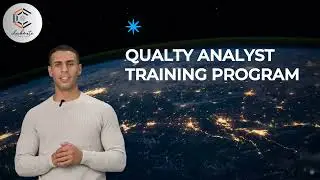Qualty Analyst Training Program by Checkmate IT Tech
Why is Quality Assurance Testing Certification Essential?
Recognition and Credibility:
Certification provides recognition of a tester’s skills and expertise in manual testing, enhancing their credibility in the job market.
Skill Validation:
Certification demonstrates that a tester has a solid understanding of manual testing principles, methodologies, and best practices.
Job Opportunities:
Many employers look for certified testers as a way to filter and identify potential candidates for manual testing positions.
Career Advancement:
Certification can lead to better job opportunities and potentially higher earning potential as you progress in your testing career.
Standardization:
Certification programs often follow industry standards and best practices, ensuring that certified testers are well-versed in established methods.
Professional Development:
Pursuing certification encourages continuous learning and improvement in the field of manual testing.
Why Choose Checkmate IT Tech?
If you are looking for training providers that offer ongoing support and resources to help you succeed in your QA Manual Testing journey. Checkmate IT Tech offers a comprehensive introduction to QA Manual Testing, including both theoretical and practical aspects. These may include access to trainers, online communities, practice exercises, and job placement assistance. Checkmate IT Tech offers flexible training options that suit your schedule and learning preferences.
Curriculum
The course curriculum for a QA manual testing can vary depending on the certification program and the level of expertise being targeted. However, here is a general outline of topics that might be covered in a QA manual testing course:
Introduction to Software Testing:
Test Case Design:
Defect Management:
Black Box Testing:
White Box Testing:
Test Automation Basics:
Testing Documentation:
Testing in Agile and DevOps Environments:
Best Practices and Techniques:
Interview Preparation and Soft Skills:
Career Transition
"I'm grateful for this QA Manual course, as it transformed my understanding of testing methodologies. The instructor's passion for teaching and the interactive sessions made learning enjoyable. The practical tips shared during the course are already proving beneficial in my work as a Junior QA Tester."
David R.
"The QA Manual course exceeded my expectations! The instructor's explanations were clear and concise, and the hands-on exercises really solidified my understanding of manual testing techniques. I now feel confident in writing test cases and executing them effectively."
John D.
"As someone with limited technical background, I was a bit apprehensive about learning QA, but this manual testing course made it accessible and enjoyable. The instructor's step-by-step approach and real-world examples helped me grasp concepts quickly. I'm ready to start my journey in the QA field!"
Sarah P.
"The QA Manual course was comprehensive and well-structured. The mix of theory and practical exercises allowed me to apply what I learned in real scenarios. The instructor's expertise and the supportive online community were invaluable resources throughout the course."
Michael S.
"I've taken a few QA courses before, but this manual testing course truly stood out. The course materials were up-to-date and relevant, and the assignments challenged me to think critically. The course not only taught me QA skills but also boosted my confidence to pursue a QA career."
Emily L.
"I'm grateful for this QA Manual course, as it transformed my understanding of testing methodologies. The instructor's passion for teaching and the interactive sessions made learning enjoyable. The practical tips shared during the course are already proving beneficial in my work as a Junior QA Tester."
David R.
"The QA Manual course exceeded my expectations! The instructor's explanations were clear and concise, and the hands-on exercises really solidified my understanding of manual testing techniques. I now feel confident in writing test cases and executing them effectively."
John D.
PreviousNext
Skills
Test Execution Test Case Design Defect Identification
Planning and Strategy for Test
Testing for Regression
Testing Records
Communication
Critical Analysis
Observation of Details
Monitoring and Management of Defects
Adaptability
Problem-Solving
Qualitative Assurance Guidelines
Management of time
User Viewpoint
Meet Your Mentors
Experience: Maria Rodriguez is a QA Lead with a background in manual testing and test management. She has experience in test planning, test case design, test execution, and coordinating testing efforts across teams. Course Insights: Maria's training sessions will emphasize QA test management, including test planning, test case organization, test execution tracking, and reporting. She will guide students through managing effective manual testing processes.







![ENHYPEN (엔하이픈) – Royalty [Color Coded Lyrics Han/Rom/Ina ]](https://images.videosashka.com/watch/SnkFfyXUktc)























